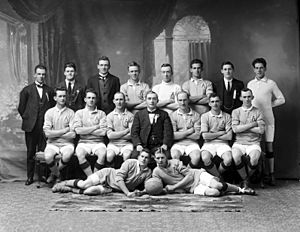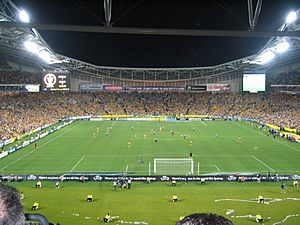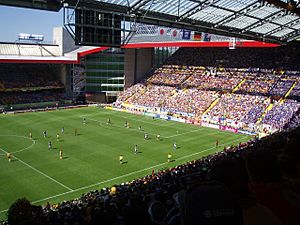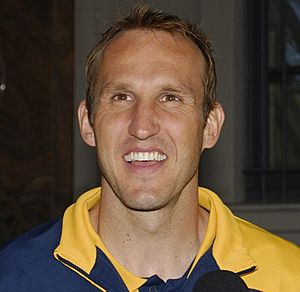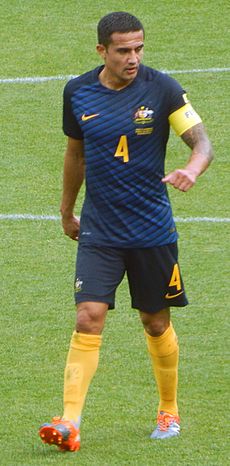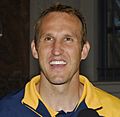Australia men's national soccer team facts for kids
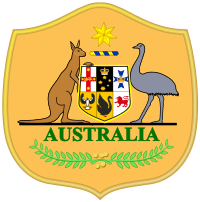 |
||||||||||||||||||||||||||||||||||||||||||||||||||
| Nickname(s) | Socceroos | |||||||||||||||||||||||||||||||||||||||||||||||||
|---|---|---|---|---|---|---|---|---|---|---|---|---|---|---|---|---|---|---|---|---|---|---|---|---|---|---|---|---|---|---|---|---|---|---|---|---|---|---|---|---|---|---|---|---|---|---|---|---|---|---|
| Association | Football Australia | |||||||||||||||||||||||||||||||||||||||||||||||||
| Confederation | AFC (Asia; 2006–present) OFC (Oceania; 1966–1972, 1978–2006) |
|||||||||||||||||||||||||||||||||||||||||||||||||
| Sub-confederation | AFF (Southeast Asia) | |||||||||||||||||||||||||||||||||||||||||||||||||
| Head coach | Tony Popovic | |||||||||||||||||||||||||||||||||||||||||||||||||
| Captain | Mathew Ryan | |||||||||||||||||||||||||||||||||||||||||||||||||
| Most caps | Mark Schwarzer (109) | |||||||||||||||||||||||||||||||||||||||||||||||||
| Top scorer | Tim Cahill (50) | |||||||||||||||||||||||||||||||||||||||||||||||||
| Home stadium | Various | |||||||||||||||||||||||||||||||||||||||||||||||||
| FIFA code | AUS | |||||||||||||||||||||||||||||||||||||||||||||||||
|
||||||||||||||||||||||||||||||||||||||||||||||||||
| FIFA ranking | ||||||||||||||||||||||||||||||||||||||||||||||||||
| Current | 42 |
|||||||||||||||||||||||||||||||||||||||||||||||||
| Highest | 14 (September 2009) | |||||||||||||||||||||||||||||||||||||||||||||||||
| Lowest | 102 (November 2014) | |||||||||||||||||||||||||||||||||||||||||||||||||
| Elo ranking | ||||||||||||||||||||||||||||||||||||||||||||||||||
| Current | 45 |
|||||||||||||||||||||||||||||||||||||||||||||||||
| Highest | 9 (14 August 2001) | |||||||||||||||||||||||||||||||||||||||||||||||||
| Lowest | 75 (November 1965) | |||||||||||||||||||||||||||||||||||||||||||||||||
| First international | ||||||||||||||||||||||||||||||||||||||||||||||||||
(Dunedin, New Zealand; 17 June 1922) |
||||||||||||||||||||||||||||||||||||||||||||||||||
| Biggest win | ||||||||||||||||||||||||||||||||||||||||||||||||||
(Coffs Harbour, Australia; 11 April 2001) (World record for senior international matches) |
||||||||||||||||||||||||||||||||||||||||||||||||||
| Biggest defeat | ||||||||||||||||||||||||||||||||||||||||||||||||||
(Adelaide, Australia; 17 September 1955) |
||||||||||||||||||||||||||||||||||||||||||||||||||
| World Cup | ||||||||||||||||||||||||||||||||||||||||||||||||||
| Appearances | 7 (first in 1974) | |||||||||||||||||||||||||||||||||||||||||||||||||
| Best result | Round of 16 (2006, 2022) | |||||||||||||||||||||||||||||||||||||||||||||||||
| Asian Cup | ||||||||||||||||||||||||||||||||||||||||||||||||||
| Appearances | 5 (first in 2007) | |||||||||||||||||||||||||||||||||||||||||||||||||
| Best result | Champions (2015) | |||||||||||||||||||||||||||||||||||||||||||||||||
| OFC Nations Cup | ||||||||||||||||||||||||||||||||||||||||||||||||||
| Appearances | 6 (first in 1980) | |||||||||||||||||||||||||||||||||||||||||||||||||
| Best result | Champions (1980, 1996, 2000, 2004) |
|||||||||||||||||||||||||||||||||||||||||||||||||
| Confederations Cup | ||||||||||||||||||||||||||||||||||||||||||||||||||
| Appearances | 4 (first in 1997) | |||||||||||||||||||||||||||||||||||||||||||||||||
| Best result | Runners-up (1997) | |||||||||||||||||||||||||||||||||||||||||||||||||
|
Medal record
|
||||||||||||||||||||||||||||||||||||||||||||||||||
| Website | ||||||||||||||||||||||||||||||||||||||||||||||||||
The Australia men's national soccer team plays for Australia in international soccer games. They are known as the Socceroos. Football Australia controls the team. This group is part of the Asian Football Confederation (AFC) and the ASEAN Football Federation (AFF).
The team played its first game in 1922. They were first part of the Oceania Football Confederation (OFC). Australia won the OFC Nations Cup four times between 1980 and 2004. They often did well in early FIFA World Cup qualification rounds. The team holds a world record for the biggest win in a senior international match. They beat American Samoa 31–0 in a World Cup qualifier.
Even with these wins, Australia only made it to the FIFA World Cup twice while in the OFC. This was because the OFC winner had to play another team from a different continent to qualify. In 2006, the team joined the AFC. Since then, they have qualified for every World Cup. They have now played in seven World Cups in total.
The Socceroos won the AFC Asian Cup in 2015 when they hosted it. They were also runners-up in 2011. By winning the Asian Cup, Australia became the only team to win two different confederation cups. They reached the knockout stages of the World Cup in 2006 and 2022.
The team also played in the FIFA Confederations Cup four times. They won a silver medal in 1997 and a bronze medal in 2001. Mark Schwarzer has played the most games for Australia (109). Tim Cahill has scored the most goals (50). Australia has rivalries with New Zealand, Uruguay, and Japan.
Contents
Team History: Key Moments
Early Days and First World Cup
The first Australian national team played in 1922 against New Zealand. They lost two games and drew one. For many years, Australia played mostly against New Zealand and South Africa. They also played Canada and India. In 1951, Australia had its worst loss, 17–0, against England.
Australia hosted the 1956 Melbourne Olympics. Their team was young and did not do well. They lost 4–2 to India in the quarterfinals. Even though travel became easier, Australia was still far from other countries. They won the 1967 South Vietnam Independence Cup but it was not widely known.
Australia tried to qualify for the FIFA World Cup in 1966 and 1970 but lost in play-off games. They finally made it to their first World Cup in West Germany in 1974. The team, mostly made up of amateur players, drew one game and lost two. They finished last in their group without scoring any goals. It took over 30 years for Australia to return to the World Cup.
The "Golden Generation" and Big Wins
Australia often played well against strong teams, even if they didn't qualify for the World Cup. In 1988, they beat the world champions Argentina 4–1. In 1997, Australia drew with world champions Brazil. They then beat Uruguay 1–0 to reach the 1997 FIFA Confederations Cup final.
In 2001, Australia beat world champions France. They finished third in the 2001 FIFA Confederations Cup by beating Brazil 1–0. In 2003, Australia beat England 3–1.
In 2005, Australia decided to leave the OFC and join the Asian Football Confederation (AFC). Many people thought this was the best way for Australian soccer to improve. FIFA approved the move in June 2005. The change officially happened on January 1, 2006.
Australia still had to qualify for the 2006 FIFA World Cup as an OFC member. After a tough qualifying campaign, coach Frank Farina left. Guus Hiddink became the new coach. Australia, ranked 49th, had to play Uruguay, ranked 18th. This was a rematch of a play-off from 2001.
Australia lost the first game 1–0. The second game was in Sydney on November 16, 2005. Australia won 1–0 after a goal by Mark Bresciano. The score was tied, so they played extra time. No one scored, so it went to a penalty shootout. Australia won 4–2. Goalkeeper Mark Schwarzer saved two penalties. John Aloisi scored the winning penalty. This was Australia's first World Cup qualification in 32 years.
Australia was one of the lowest-ranked teams at the 2006 World Cup. They were in a tough group with Japan, Croatia, and Brazil. In their first game, Australia beat Japan 3–1. Tim Cahill scored two goals, and John Aloisi scored one in the last eight minutes. These were Australia's first World Cup goals. It was also the first win for an Oceanian team in the tournament. Australia lost 2–0 to Brazil in their second game. They drew 2–2 with Croatia in their third game. This was enough to reach the Round of 16. They lost 1–0 to Italy after a controversial penalty. This team was later called the "golden generation" of Australian soccer.
Recent World Cups and Asian Cup Win
Under coach Graham Arnold, Australia played in their first AFC Asian Cup in 2007. They had many players from the 2006 World Cup team. They drew with Oman, beat Thailand, and lost to Iraq. They reached the quarter-finals but lost to Japan on penalties.
Australia qualified for the 2010 FIFA World Cup in South Africa. They were in a group with Germany, Ghana, and Serbia. They lost 4–0 to Germany. They drew 1–1 with Ghana and won 2–1 against Serbia. They were eliminated based on goal difference.
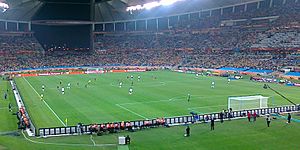
In 2011, Australia reached the Asian Cup final but lost 1–0 to Japan in extra time. Australia also joined the ASEAN Football Federation in 2013. However, they do not play in the AFF Championship.
Australia qualified for the 2014 FIFA World Cup in Brazil. They lost two friendly games 6–0 to Brazil and France. Coach Holger Osieck was then replaced by Ange Postecoglou.
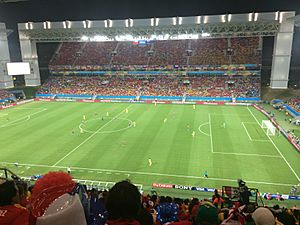
At the 2014 World Cup, Australia was in a very tough group. They played against Spain, Netherlands, and Chile. They lost all three games but played well. Many believed a new "Golden Generation" was starting.
In 2015, Australia hosted the 2015 AFC Asian Cup. They won their first two group games against Kuwait and Oman. They lost their final group game to South Korea. In the quarter-finals, they beat China 2–0. They then beat the United Arab Emirates 2–0 in the semi-finals. Australia won the final 2–1 against South Korea after extra time. This was their first Asian title.
After qualifying for the 2018 FIFA World Cup, coach Ange Postecoglou resigned. Bert van Marwijk took over. Australia was in a group with Denmark, France, and Peru. They lost 2–1 to France and drew 1–1 with Denmark. They lost 2–0 to Peru and were eliminated. Graham Arnold became coach again after the World Cup.
In the 2019 AFC Asian Cup, Australia lost their first game to Jordan. They beat Palestine and Syria to reach the knockout stage. They beat Uzbekistan on penalties but lost 1–0 to the United Arab Emirates in the quarter-finals.
2022 FIFA World Cup Success
Australia played in the 2022 World Cup qualifiers. They won all eight games in the second round. In the third round, they finished third in their group. This meant they had to play in play-off games.
Due to the COVID-19 pandemic, all play-offs were in Doha. Australia beat the United Arab Emirates 2–1. They then faced Peru, a rematch from the 2018 World Cup. Australia drew 0–0 and won on penalties to qualify for the World Cup in Qatar.
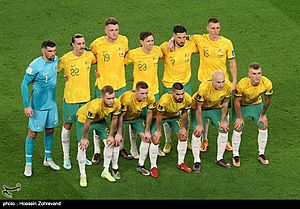
Australia was in a group with France, Denmark, and Tunisia. They lost their first game 4–1 to France. Three days later, they beat Tunisia 1–0 with a goal from Mitchell Duke. This was Australia's first World Cup win since 2010. Four days later, they beat Denmark 1–0 with a goal from Mathew Leckie. Australia finished second in their group, reaching the knockout stage. This was a big achievement for Australian soccer fans. In the Round of 16, Australia lost 2–1 to Argentina.
2026 World Cup Qualification
On September 20, 2024, Graham Arnold stepped down as head coach. Tony Popovic was appointed as the new head coach on September 23, 2024. Popovic led the Socceroos to wins over Japan and Saudi Arabia. Australia has now qualified directly for the 2026 World Cup. This is their sixth World Cup in a row.
Team Look and Feel
Media Coverage
You can watch Australian matches on Paramount+ and Network 10. In the past, games were shown on Fox Sports, ABC, SBS, and Nine.
Soccer games have set high viewing records in Australia. The 2006 World Cup qualifying match against Uruguay was watched by 3.4 million people on SBS. The 2015 Asian Cup Final had 5.3 million Australians watching.
Kit (Uniform)
The Socceroos' uniform is designed by First Nations artist Reko Rennie. The home shirt is mostly yellow with light green patterns. The shorts are dark green, and the socks are white. The away kit is mostly black with pink and green patterns.
Australia's first uniform in 1922 was light blue with a maroon stripe on the socks. These colors represented New South Wales and Queensland. In 1924, they changed to Australia's national colors: green and gold.
Since the 1960s, Australia has worn a yellow jersey with green shorts and yellow socks. The team's jersey usually has the coat of arms of Australia on it. Nike has made Australia's kits since 2004. The 2014 World Cup kit was plain yellow with a green collar, dark green shorts, and white socks. This was a tribute to the 1974 team.
Kit Suppliers
| Kit supplier | Period | Notes |
|---|---|---|
| Umbro | 1974–1983 | 1974 FIFA World Cup jerseys were made by Adidas but had an Umbro logo. |
| Adidas | 1983–1989 | |
| Kingroo | 1990–1993 | |
| Patrick | 1993 | |
| Adidas | 1993–2004 | |
| Nike | 2004–present | Current deal runs until 2033. |
Nickname: Socceroos
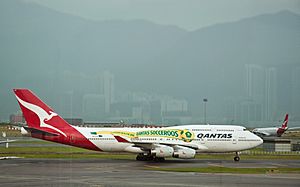
The nickname "Socceroos" was created in 1967 by a journalist named Tony Horstead. It is a mix of "soccer" and "kangaroo," a famous Australian animal. This nickname is used by fans, the media, and the team itself. It's similar to other Australian team nicknames like "Olyroos" (for the Olympic soccer team) and "Hockeyroos" (for the women's hockey team).
Sponsorship
The team is currently called "Subway Socceroos" because of a partnership with the restaurant chain Subway. This deal will end in August 2025. After that, Commonwealth Bank will take over the naming rights.
Before Subway, the team was known as "Caltex Socceroos." Qantas has been the team's official airline since 2004.
Rivalries: Who They Play Against
New Zealand
Australia's oldest rivals are their neighbors, New Zealand. Their first game was in 1922. This rivalry is part of a bigger friendly competition between the two countries. When both teams were in the OFC, they often played each other in important games. Now that Australia is in the AFC, they play less often.
Japan
After joining the AFC, Australia developed a strong rivalry with Japan. This started at the 2006 World Cup when they were in the same group. They have played many important games since then, including the 2011 Asian Cup final.
South Korea
South Korea is another big rival in Asia. They played against each other in World Cup qualifiers in the 1970s. Since Australia joined the AFC, they have met often, including in the 2015 Asian Cup final.
Uruguay
Australia also has a rivalry with Uruguay. They played each other in World Cup play-offs in 2001 and 2005. Each team won one play-off to qualify for the World Cup.
Supporters
The main fan group for the Australian team is Australian Active Support (AAS). This group helps organize fans and cheer for the team. They use social media to connect with supporters.
Home Stadiums
Australia does not have one main stadium. The team plays games at different stadiums across the country. Big matches are often held at Stadium Australia in Sydney, Hunter Stadium in Newcastle, and Docklands Stadium in Melbourne. Other stadiums like the Melbourne Cricket Ground and Canberra Stadium also host games.
Australia played its first home international match in 1923 at the Gabba in Brisbane. They won 2–1 against New Zealand.
Games in England
The Socceroos have played many games in England, especially London. This is because many Australian players play for European clubs. They have played at stadiums like Craven Cottage, Loftus Road, and The Den.
Coaching Staff
| Position | Name |
|---|---|
| Director of football | |
| Head coach | |
| Assistant coaches | |
| Goalkeeping coach | |
| Team analyst | |
| Sports dietician |
Players
Current Squad
The following 26 players were chosen for the 2026 FIFA World Cup qualifiers in June. Caps and goals are correct as of June 10, 2025, after the match against Saudi Arabia.
| No. | Pos. | Player | Date of birth (age) | Caps | Goals | Club |
|---|---|---|---|---|---|---|
| 1 | GK | Mathew Ryan (captain) | 8 April 1992 | 100 | 0 | Unattached |
| 12 | GK | Paul Izzo | 6 January 1995 | 0 | 0 | |
| 18 | GK | Joe Gauci | 4 July 2000 | 7 | 0 | |
|
|
||||||
| 2 | DF | Miloš Degenek | 28 April 1994 | 48 | 1 | |
| 3 | DF | Lewis Miller | 24 August 2000 | 14 | 2 | |
| 4 | DF | Kye Rowles | 24 June 1998 | 25 | 1 | |
| 7 | DF | Kai Trewin | 18 May 2001 | 0 | 0 | |
| 10 | DF | Kasey Bos | 8 May 2004 | 0 | 0 | |
| 16 | DF | Aziz Behich | 16 December 1990 | 81 | 3 | |
| 21 | DF | Cameron Burgess | 21 October 1995 | 17 | 0 | |
| 22 | DF | Jason Geria | 10 May 1993 | 10 | 0 | |
| 23 | DF | Alessandro Circati | 10 October 2003 | 5 | 0 | |
|
|
||||||
| 5 | MF | Anthony Caceres | 29 September 1992 | 4 | 0 | |
| 8 | MF | Connor Metcalfe | 5 November 1999 | 26 | 1 | |
| 13 | MF | Aiden O'Neill | 4 July 1998 | 21 | 0 | |
| 14 | MF | Riley McGree | 2 November 1998 | 31 | 1 | |
| 17 | MF | Ryan Teague | 24 January 2002 | 3 | 0 | |
| 19 | MF | Patrick Yazbek | 5 April 2002 | 4 | 0 | |
| MF | Paul Okon-Engstler | 24 January 2005 | 0 | 0 | ||
|
|
||||||
| 6 | FW | Martin Boyle | 25 April 1993 | 34 | 10 | |
| 9 | FW | Mohamed Toure | 26 March 2004 | 2 | 0 | |
| 11 | FW | Brandon Borrello | 25 July 1995 | 16 | 2 | |
| 15 | FW | Mitch Duke | 18 January 1991 | 48 | 13 | |
| 20 | FW | Marco Tilio | 23 August 2001 | 10 | 0 | |
| FW | Adam Taggart | 2 June 1993 | 21 | 7 | ||
| FW | Daniel Arzani | 4 January 1999 | 10 | 1 | ||
Recent Call-ups
These players have also been called up in the last 12 months.
| Pos. | Player | Date of birth (age) | Caps | Goals | Club | Latest call-up |
|---|---|---|---|---|---|---|
| GK | Tom Glover | 24 December 1997 | 0 | 0 | Abu Dhabi Training Camp, 16 May 2025 | |
|
|
||||||
| DF | Jason Davidson | 29 June 1991 | 23 | 1 | Unattached | Abu Dhabi Training Camp, 16 May 2025 |
| DF | Alex Gersbach | 8 May 1997 | 6 | 0 | Abu Dhabi Training Camp, 16 May 2025 | |
| DF | Alex Bonetig | 20 August 2002 | 0 | 0 | Abu Dhabi Training Camp, 16 May 2025 | |
| DF | Sebastian Esposito | 21 April 2005 | 0 | 0 | Abu Dhabi Training Camp, 16 May 2025 | |
| DF | Jack Iredale | 2 May 1996 | 0 | 0 | Abu Dhabi Training Camp, 16 May 2025 | |
| DF | Ryan Strain | 2 April 1997 | 6 | 0 | Abu Dhabi Training Camp, 16 May 2025 INJ | |
| DF | Fran Karačić | 12 May 1996 | 15 | 1 | v. |
|
| DF | Alex Grant | 23 January 1994 | 0 | 0 | v. |
|
| DF | Harry Souttar | 22 October 1998 | 36 | 11 | v. |
|
| DF | Rhyan Grant | 26 February 1991 | 21 | 1 | v. |
|
| DF | Jordan Bos | 29 October 2002 | 19 | 1 | v. |
|
| DF | Hayden Matthews | 19 June 2004 | 1 | 0 | v. |
|
| DF | Thomas Deng | 20 March 1997 | 5 | 0 | v. |
|
| DF | Gianni Stensness | 7 February 1999 | 2 | 0 | v. |
|
|
|
||||||
| MF | Keanu Baccus | 7 June 1998 | 21 | 1 | Abu Dhabi Training Camp, 16 May 2025 | |
| MF | Max Balard | 20 November 2000 | 0 | 0 | Abu Dhabi Training Camp, 16 May 2025 | |
| MF | Nectarios Triantis | 11 May 2003 | 0 | 0 | Abu Dhabi Training Camp, 16 May 2025 WD | |
| MF | Jackson Irvine | 7 March 1993 | 78 | 14 | v. |
|
| MF | Ajdin Hrustic | 5 July 1996 | 31 | 4 | Unattached | v. |
| MF | Luke Brattan | 8 March 1990 | 1 | 0 | v. |
|
| MF | Massimo Luongo | 25 September 1992 | 45 | 6 | Unattached | v. |
| MF | Cameron Devlin | 7 June 1998 | 4 | 0 | v. |
|
| MF | Josh Nisbet | 15 June 1999 | 3 | 0 | v. |
|
|
|
||||||
| FW | Kusini Yengi | 15 January 1999 | 11 | 6 | Abu Dhabi Training Camp, 16 May 2025 | |
| FW | Nicolas Milanovic | 14 November 2001 | 0 | 0 | Abu Dhabi Training Camp, 16 May 2025 | |
| FW | Craig Goodwin | 16 December 1991 | 31 | 7 | v. |
|
| FW | Nishan Velupillay | 7 May 2001 | 5 | 3 | v. |
|
| FW | Samuel Silvera | 25 October 2000 | 7 | 0 | v. |
|
| FW | Nestory Irankunda | 9 February 2006 | 5 | 1 | v. |
|
| FW | Apostolos Stamatelopoulos | 9 April 1999 | 1 | 0 | v. |
|
| FW | Awer Mabil | 15 September 1995 | 35 | 9 | v. |
|
| FW | John Iredale | 1 August 1999 | 2 | 1 | v. |
|
|
||||||
Team Records
Australia holds the world record for the largest win in an international match. They beat American Samoa 31–0 on April 11, 2001. In that game, Archie Thompson scored 13 goals and David Zdrilic scored eight. This also set a record for the most goals by a player in an international match.
Most Games Played
| Rank | Name | Caps | Goals | Position | Career |
|---|---|---|---|---|---|
| 1 | Mark Schwarzer | 109 | 0 | GK | 1993–2013 |
| 2 | Tim Cahill | 108 | 50 | FW | 2004–2018 |
| 3 | Mathew Ryan | 100 | 0 | GK | 2012–present |
| 4 | Lucas Neill | 96 | 1 | DF | 1996–2013 |
| 5 | Brett Emerton | 95 | 20 | MF | 1998–2012 |
| 6 | Alex Tobin | 87 | 2 | DF | 1988–1998 |
| 7 | Mark Bresciano | 84 | 13 | MF | 2001–2015 |
| Paul Wade | 84 | 10 | MF | 1986–1996 | |
| 9 | Aziz Behich | 81 | 3 | DF | 2012–present |
| 10 | Mark Milligan | 80 | 6 | MF | 2006–2019 |
| Luke Wilkshire | 80 | 8 | DF | 2004–2014 |
Top Goal Scorers
| Rank | Name | Goals | Caps | Ratio | Career |
|---|---|---|---|---|---|
| 1 | Tim Cahill (list) | 50 | 108 | 0.46 | 2004–2018 |
| 2 | Damian Mori | 29 | 45 | 0.64 | 1992–2002 |
| 3 | Archie Thompson | 28 | 54 | 0.52 | 2001–2013 |
| 4 | John Aloisi | 27 | 55 | 0.49 | 1993–2008 |
| 5 | John Kosmina | 25 | 60 | 0.42 | 1977–1988 |
| Attila Abonyi | 25 | 61 | 0.41 | 1967–1977 | |
| 7 | David Zdrilic | 20 | 31 | 0.65 | 1997–2010 |
| Mile Jedinak | 20 | 79 | 0.25 | 2008–2018 | |
| Brett Emerton | 20 | 95 | 0.21 | 1998–2012 | |
| 10 | Graham Arnold | 19 | 56 | 0.34 | 1985–1997 |
Most Clean Sheets (Goalkeepers)
| Rank | Name | Clean sheets | Caps | Ratio | Career |
|---|---|---|---|---|---|
| 1 | Mark Schwarzer | 44 | 109 | 0.4 | 1993–2013 |
| 2 | Mathew Ryan | 38 | 100 | 0.38 | 2012–present |
| 3 | Zeljko Kalac | 24 | 54 | 0.44 | 1992–2006 |
| 4 | Jeff Olver | 13 | 37 | 0.35 | 1985–1989 |
| 5 | Robert Zabica | 12 | 27 | 0.44 | 1990–1994 |
FIFA Rankings
Last updated on March 23, 2025
Best Ranking Worst Ranking Best Mover Worst Mover
| Australia's FIFA world rankings | ||||||||
|---|---|---|---|---|---|---|---|---|
| Rank | Year | Games Played |
Best | Worst | ||||
| Rank | Move | Rank | Move | |||||
| 26 | 2025 | 1 | 26 | 26 | ||||
| 26 | 2024 | 16 | 23 | 26 | ||||
| 25 | 2023 | 8 | 25 | 29 | ||||
| 27 | 2022 | 13 | 27 | 42 | ||||
| 35 | 2021 | 10 | 32 | 41 | ||||
| 41 | 2020 | 0 | 41 | 42 | ||||
| 42 | 2019 | 10 | 41 | 46 | ||||
| 41 | 2018 | 11 | 32 | 43 | ||||
| 38 | 2017 | 13 | 38 | 55 | ||||
| 47 | 2016 | 10 | 40 | 68 | ||||
| 57 | 2015 | 14 | 57 | 100 | ||||
| 100 | 2014 | 11 | 53 | 102 | ||||
| 58 | 2013 | 12 | 36 | 59 | ||||
| 36 | 2012 | 13 | 20 | 36 | ||||
| 23 | 2011 | 17 | 19 | 26 | ||||
| 26 | 2010 | 13 | 19 | 26 | ||||
| 21 | 2009 | 12 | 14 | 32 | ||||
| 28 | 2008 | 13 | 28 | 48 | ||||
| 48 | 2007 | 10 | 39 | 52 | ||||
| 39 | 2006 | 13 | 33 | 48 | ||||
| 48 | 2005 | 12 | 48 | 60 | ||||
| 58 | 2004 | 12 | 49 | 89 | ||||
| 82 | 2003 | 3 | 45 | 82 | ||||
| 50 | 2002 | 4 | 43 | 50 | ||||
| 48 | 2001 | 16 | 46 | 77 | ||||
| 73 | 2000 | 15 | 63 | 92 | ||||
| 89 | 1999 | 0 | 50 | 89 | ||||
| 39 | 1998 | 9 | 32 | 39 | ||||
| 35 | 1997 | 19 | 31 | 36 | ||||
| 50 | 1996 | 12 | 48 | 61 | ||||
| 51 | 1995 | 9 | 47 | 58 | ||||
| 58 | 1994 | 6 | 44 | 58 | ||||
| 49 | 1993 | 10 | 49 | 65 | ||||
Team Achievements
Worldwide Competitions
Intercontinental Competitions
Continental Competitions
Friendly Tournaments
- Trans-Tasman Cup (4): 1986, 1988, 1991, 1995
- Soccer Ashes (5): 1933, 1936, 1948, 1954, 2023
- Indonesian Independence Cup (1): 1990
- South Vietnam Independence Cup (1): 1967
- Australia Bicentenary Gold Cup (1): 1988
- Merlion Cup (2): 1982, 1983
Awards
- AFC Men's Team of the Year (2): 2006, 2015
- AFC Asian Cup Fair Play Award (1): 2015
Summary of Major Titles
| Senior Competition | Total | |||
|---|---|---|---|---|
| FIFA Confederations Cup | 0 | 1 | 1 | 2 |
| AFC Asian Cup | 1 | 1 | 0 | 2 |
| OFC Nations Cup | 4 | 2 | 0 | 6 |
| AFC–OFC Challenge Cup | 0 | 1 | 0 | 1 |
| Total | 5 | 5 | 1 | 11 |
Images for kids
-
Australia playing Uruguay at Stadium Australia to determine the last qualifying spot for the 2006 World Cup.
-
Australia against Germany in Moses Mabhida Stadium, at the 2010 World Cup
-
Australia against Chile in Arena Pantanal, Cuiabá, at the 2014 World Cup.
-
Australia match against Kuwait in 2015 AFC Asian Cup opening match
-
One of the matches of the 2006 World Cup was a group stage match between Australia and Japan at Fritz-Walter-Stadion in Kaiserslautern, Germany.
-
Socceroos livery on a Qantas 747–400
-
Australia before their match against France in the 2022 FIFA World Cup opening match
See also
 In Spanish: Selección de fútbol de Australia para niños
In Spanish: Selección de fútbol de Australia para niños
 | Laphonza Butler |
 | Daisy Bates |
 | Elizabeth Piper Ensley |


